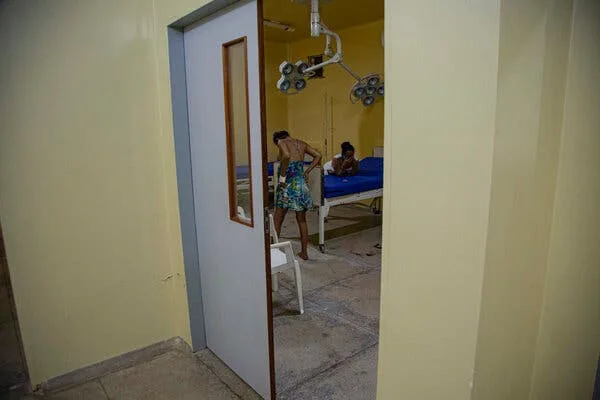Black women in Latin America, the Caribbean and the United States are more likely than their white counterparts to report denial of medication or physical and verbal abuse in health care settings.
The News
A new United Nations analysis of Black women’s experiences during pregnancy and childbirth in the Americas has concluded that systemic racism and sexism in medical systems — not genetics or lifestyle choices — are the main reasons they are more likely to experience serious complications or even death.
The report, published Wednesday by the U.N.’s sexual and reproductive health agency, the United Nations Population Fund, surveyed data from countries in the Americas, including the United States. It found that Black women were more likely than their white counterparts to report denial of medication or physical and verbal abuse in health care settings, leading to more severe complications, delayed treatment and worse.
Black women were more likely to die during or soon after childbirth, the analysis found, though it did not specify how much more likely.

Why It Matters: The problem extends beyond the United States.
The United States’ maternal death rates have drawn public concern in recent years, with mounting evidence of Black women’s experiences of discrimination and dismissal in health care settings. In the new report, the U.N. expanded the scope of the issue to include the rest of the Americas.
Direct country-to-country comparisons were difficult because most of the nations analyzed did not collect maternal health or death data by race. The U.N. researchers looked at data from 35 countries in Latin America, North America and the Caribbean, but found sufficient data to include only nine in the report: Brazil, Colombia, Costa Rica, Cuba, Panama, Suriname, Trinidad and Tobago, the United States and Uruguay.
Still, this is the first time the U.N. has examined available data on the maternal health of Black women across the Americas. “The result is horrendous,” said Dr. Natalia Kanem, executive director of the agency.
Dr. Kanem, who is herself a physician and Black, called the problem “a human rights crisis that is largely ignored or overlooked by decision makers.”
The U.N. analysis said that high maternal death rates among Black women have historically been attributed to genetic factors and lifestyle choices, rather than patterns of bias that begin in medical school and continue through health service delivery.
Medical school curriculums, for example, include erroneous claims that Black women’s nerve endings are “less sensitive” and require less anesthesia, and that Black women’s blood coagulates faster than that of white women, leading to delayed treatment for dangerous hemorrhages, according to the report. It also found that textbook illustrations of childbirth were depicted on European women’s pelvic anatomy, which could cause unnecessary interventions when nonwhite variability was deemed “abnormal or high-risk.”
“When a Black woman dies during childbirth, whether in São Paulo, Bogotá or New York, it’s often put down to her lifestyle or to individual failure: She didn’t get there in time to see the doctor or the nurse, she made poor life decisions, she was predisposed to certain medical conditions. And then the world moves on,” Dr. Kanem said.
The new report, she said, “categorically refutes that.”
Background: Maternal deaths are on the rise.
The overall maternal mortality ratio of maternal deaths per 100,000 live births in Latin America, North America and the Caribbean increased by about 15 percent between 2016 and 2020, piquing officials’ interest in possible contributing factors, including race. There are more than 200 million people of African descent in the Americas — one in four people in Latin America and the Caribbean, and one in seven in the United States and Canada.
Among countries that provide maternal death rates by race, the United States has the lowest death rate overall, but the widest racial disparities. Black women in the United States are three times more likely than white women to die during or soon after childbirth. Those problems persist across income and education levels, as Black women with college degrees are still 1.6 times as likely to die in childbirth than white women who have not finished high school.
What’s Next: U.N. calls medical schools, health care providers and governments to action.
U.N. officials urged medical schools to re-examine their curriculums and hospitals to strengthen policies surrounding denial of care and patient abuse. Medical teams must also consider innovative ways to help Black women overcome structural barriers that make it difficult to receive sufficient prenatal care, officials said, such as a lack of access to reliable transportation and insurance. The agency suggested partnerships with various Black traditional healers and midwives to help navigate longstanding reservations.
The U.N. project also revealed a profound dearth of surveillance data, which has likely kept the problems from becoming well known, it said. The report encouraged every country to enhance its data collection efforts. Without a transparent look at the problem, the report said, it will be near impossible to design interventions to remedy it.

